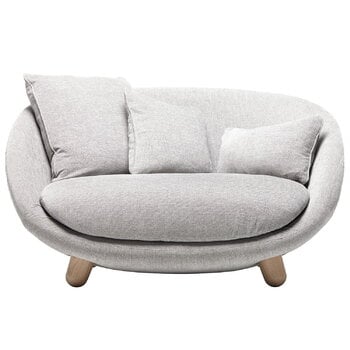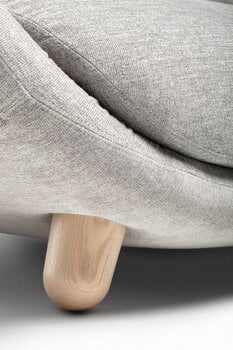Moooi’s Love sofa is characterised by softly curved shapes that invite you to a gentle embrace, and it has a lovely rounded feel all they way down to its charming wooden legs. The comfy, cosy, ultimate nest of comfort is just perfect for cuddling up next to that special someone or taking a moment for yourself with a good book, film or whatever it is that tickles your fancy.
Love sofa, Liscio Nebbia
Moooi
Description
Moooi’s Love sofa is characterised by softly curved shapes that invite you to a gentle embrace, and it has a lovely rounded feel all they way down to its charming wooden legs. The comfy, cosy, ultimate nest of comfort is just perfect for cuddling up next to that special someone or taking a moment for yourself with a good book, film or whatever it is that tickles your fancy.
Product details (12)
- Colour
- Light grey
- Width
- 129 cm
- Depth
- 105 cm
- Height
- 77 cm
- Seat depth
- 64–74 cm
- Seat height
- 30–38 cm
- Frame material
- Moulded foam with metal frame
- Upholstery fabric
- Liscio Nebbia: 35% wool, 35% viscose, 21% cotton, 9% polyamide
- Abrasion resistance
- 30,000 Martindale
- Lightfastness
- 4-6
- Base material
- Stained wood
- Notes
- Including pillows
- Product ID
Designer
The Dutch designer Marcel Wanders (born 1963) graduated from ArtEZ Institute of the Arts in Arnhem in 1988. In 1995, he opened his own studio in Amsterdam and, only a year after, he received a lot of international recognition by creating the iconic Knotted Chair.
Read moreReviews (0)
Sustainability
The Product Sustainability Framework, our criteria of sustainable design, helps you find the most sustainable products in our selection. Read below which sustainability criteria this product has met.
Working conditions & labour 9/9
-
Equal opportunities for all employees
-
Commitment to UN Global Compact, fair compensation for all employees
-
Corporate responsibility requirements defined and communicated for suppliers
-
Systematic work for improved inclusion and well-being in the workplace
-
Transparent supply chain
-
Suppliers' compliance to a code of conduct ensured
-
Direct suppliers audited and certified
-
Compliance to the UN Guiding Principles on Business and Human Rights ensured in the supply chain
-
Support for community involvement in the supply chain
Eco-friendly production 7/9
-
Fair and resource-wise water-use in production
-
No incineration or landfilling of returned items
-
No use of endangered species as materials
-
No direct environmental emissions or waste (excl. GHGs) from production
-
The sustainability of direct suppliers' production is addressed and monitored
-
Material-efficient and ecological packaging
-
No potentially harmful chemicals used in own production
Climate impact 3/8
-
Company's direct greenhouse gas emissions identified and commitment to reduction
-
Product's carbon impact identified and commitment to reduction
-
Guidance on energy- and eco-efficient use of the product
Sustainable materials 5/6
-
Sustainable and long-lasting material choices
-
No harmful or hazardous substances
-
Responsible raw material sourcing and production
-
Materials suited for circularity: monomaterials, recyclable finishings, renewable or recycled contents etc.
-
Ecological materials: natural, biodegradable, recyclable or recycled contents
Circular design 5/5
-
High aesthetic quality promoting long-term use of the product
-
Technically durable product design and material choices
-
Design for enduring life-long quality
-
Design and support for product maintenance, repair and upgradability
-
Innovative circular design solutions: circular service system, resale platform, remanufacturing, collection of used products, etc.









